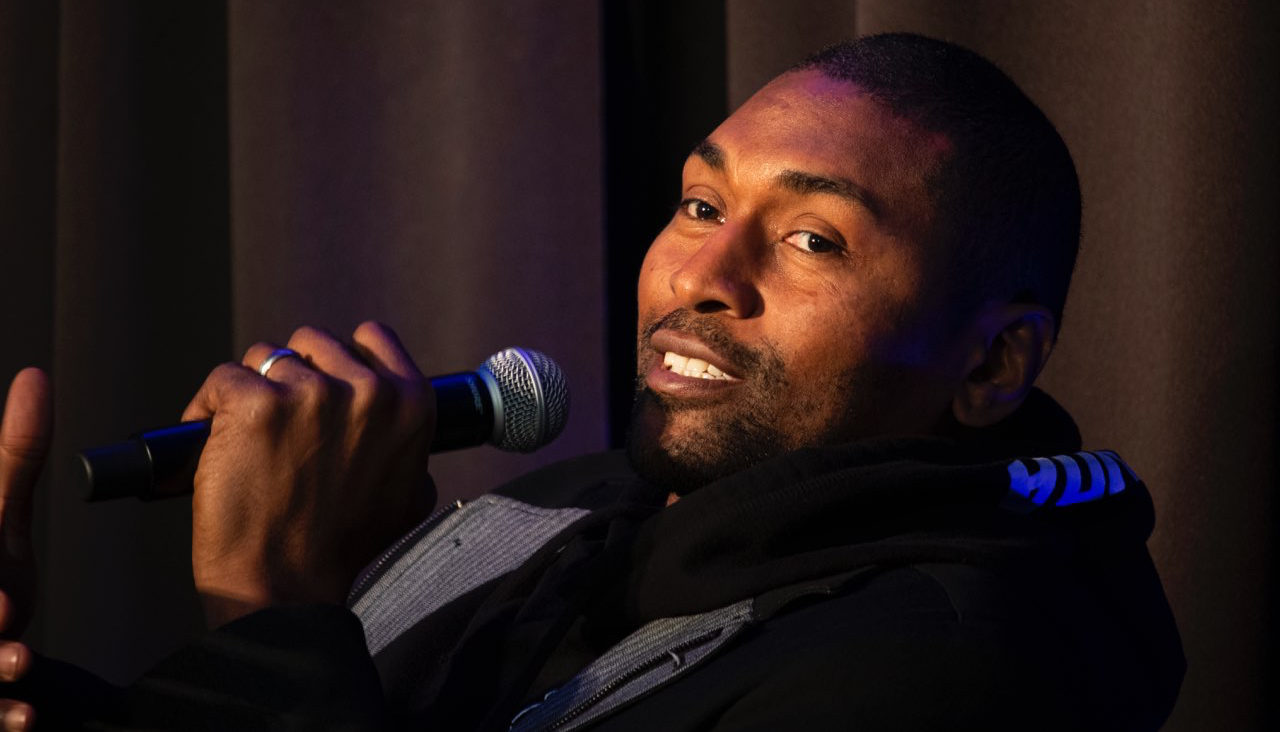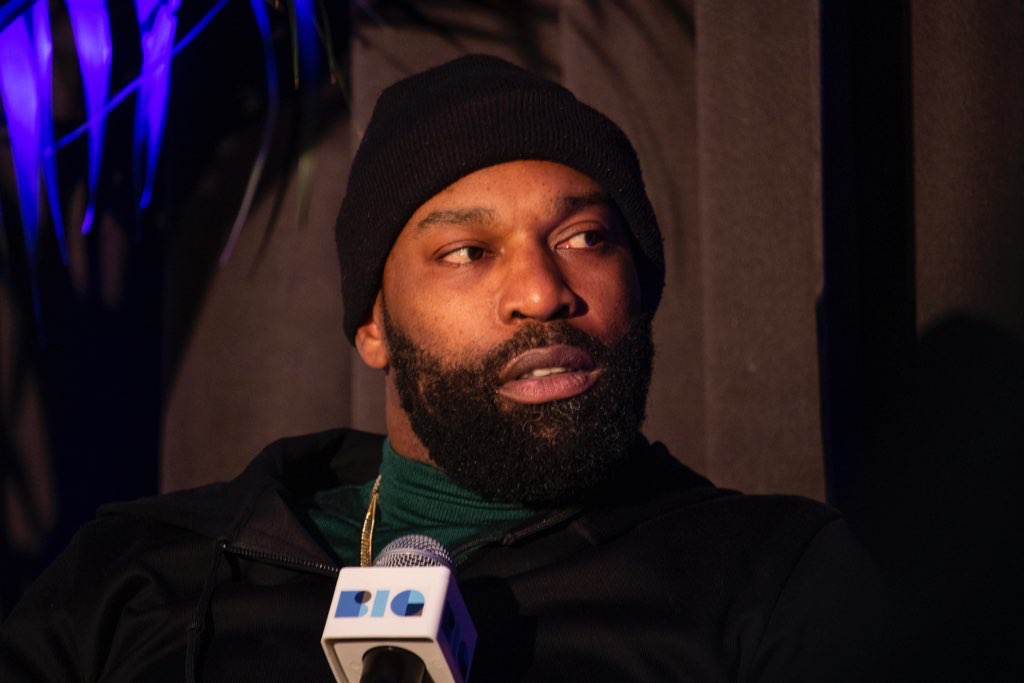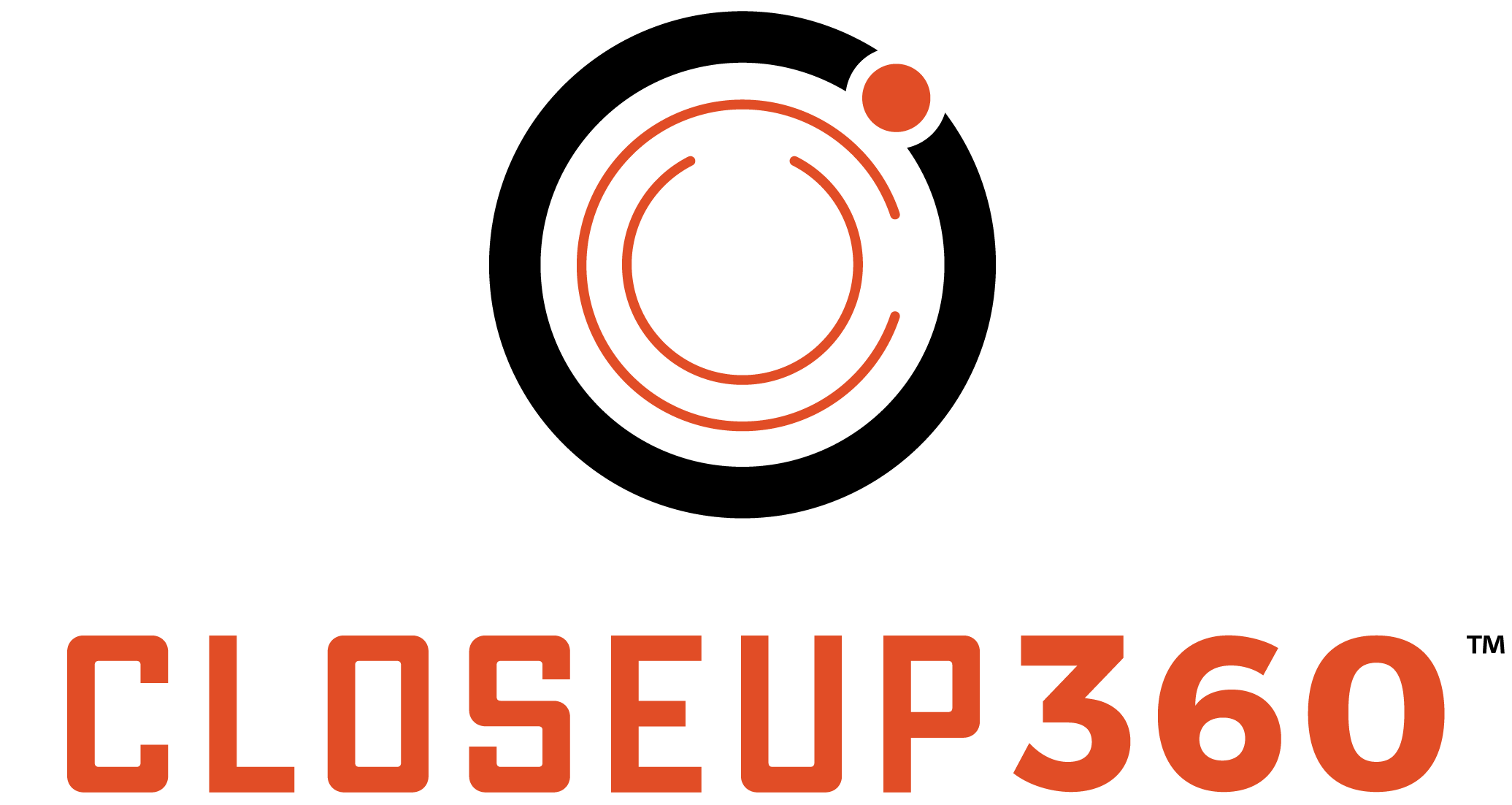
Metta World Peace Goes BIG on Coaching, Tech and Finance with Baron Davis
CHICAGO -- Three years removed from his last NBA game with the Los Angeles Lakers, Metta World Peace was as paralyzed by the coronavirus shutdown as just about anyone in the basketball world. The former All-Star, Defensive Player of the Year and champion had recently launched XvsX Sports, an app that helps hoopers find, organize and join pickup games at courts that would otherwise be underutilized.
With stay-at-home orders still in effect across most of the United States and people adhering to social distancing guidelines, weekend warriors everywhere will have to wait to use Metta's ingenious service.
Fortunately for the man formerly known as Ron Artest, the future is riding on more than an app. The 40-year-old has had his massive mitts in everything from family and coaching to finance.
During the Business Inside the Game (BIG) summit in Chicago, prior to the pandemic, Metta spoke with event host and fellow former All-Star Baron Davis about his path from Queensbridge to the NBA, his post-playing endeavors, his son Jeron's "genius" as an investor and more.
(The following transcript has been edited for clarity and length.)

Baron Davis and Metta World Peace both entered the NBA by way of the 1999 draft. (Josh Martin)
Baron Davis: You came out of Queensbridge in New York City and brought a different attitude and approach to basketball. What was it about where you came from that made you who you were?
Metta World Peace: We grew up and we seen the city from where it was at, right? It was really grimy. And obviously, if you're from Chicago and you saw when I came here, I was straight out the hood with the Bulls. You know, it was so embedded in me, I never wanted to change. I never, ever wanted to forget where I came from, and if that meant changing to something else, I don't think I would ever do it. Not in a million years. That's when I was younger, you know? That's because of how I grew up and the culture. You've got to stay true to who you are.
BD: Just like now, right? Usually, people go to the back. You're standing there. You're a man amongst the people. As an All-Star, even in LA as a champion, you gave your championship ring up. Talk about your love for people and how you've been using your platform for the last 15 years to really connect with people and spread your message.
MWP: Yeah definitely. You know, people helped me. So when I was going to high school, my older brother did 10 years in jail for drug trafficking. He inherited some beef when I was going into high school. I went to the school, they thought I was him. I got chased out by this gang. So when I went home, I waited at school for maybe five hours before this, so everybody could leave. Then I went home. I didn't have a school to go to, but then I got to Riverside Church. Mr. Ernest Lorch gave me a scholarship to a Catholic school, which I started at, had a 60 average. I was failing. I was getting in trouble, had to sit out the first 13 games for behavior and academics, but mostly behavior. But then I kept pushing it mentally, trying to get my grades up, and I was able to pass the SATs and get to college.
BD: Why did you choose to stay home for college?
MWP: I'm so proud of New York City. Every time the Knick [coaching] job is available, I'm always, like...
BD: You should take the Knick job.
MWP: I don't really care, honestly, but I would take it. It's the only job I want. That job, the St. John's [job]...I’m not the type of person that would say, "I hope somebody has a losing season or"...
BD: Let's hope St. John's lose, so you can get the job [laughs].
MWP: No, it's fine. I hope they win. But there's a couple jobs that I'm, like, really...I'm not interested in being an assistant coach. People is always saying, “Hey, why don't you wanna be an assistant?” Because I just don't want to. I want to go straight to the head job.
BD: But you've been paying your dues. You live in LA. You coach the girls' high school basketball team. What made you want to do that?
MWP: There's a great coach, coach Torino Johnson from LA. I love coaching under him. He reminds me of Phil Jackson. I figure if I coach under great coaches, then I'll learn a lot. I played under Rick Carlisle, Phil Jackson, Rick Adelman, all these great coaches. Torino Johnson's one of them. So at Palisades [High School], he was coaching girls and I said, “I would love to join your staff, to figure out how you work with the players.” So I coached twice there, two back-to-back titles. I coached Beverly Hills High School as an assistant coach. I coached Hillcrest Academy in Arizona. I'm coaching Inglewood next year.
BD: Talk about the difference of playing and then coaching girls, women's basketball. Is there a difference?
MWP: I think the girls is smart. They just smart, smarter than men. I love coaching girls' basketball because they just get it so quick. And I love the challenge of coaching. I actually like coaching adults also. I coach the Drew League. I enjoy it.
BD: You do a good job in that. You've been bringing a team for over the last 10 years to the Drew. Your love for basketball is on a whole 'nother level, you know what I mean? Just from when I've known you, from high school, all the way until the league, you would go play basketball with no shoes on. I swear to God, you would. Talk about your experience with the Lakers, the Bulls, coming into the league and how your love of basketball drove you through to figure out who you were.
MWP: Man, I think for me, basketball is something that kept me out of trouble. So I just said, “Do I wanna go to jail or do I wanna do something positive?” And basketball was it. My connection to basketball, it's a little bit different. Somebody might have love for the game, but basketball, to me, is about not going to jail, not dying, not selling drugs. That's what I think of when I think of basketball. And when I'm doing anything in basketball, it's a personal connection. When I'm doing my basketball app, or if I wanna coach the Knicks and I become so passionate about it, because it's bigger than just a job. It's bigger than just a game for me. I reflect on everything that I've been through when I'm doing anything in basketball. That's why I put my passion into it. It's just a different connection with basketball.
BD: When did you decide basketball wasn't the struggle anymore? When it was, like, I'm in the league, I'm in my damn near seventh year, you know what I mean? You're an All-Star. When did you start making the transition and what made you make the transition to say, “You know what? I'm not gonna die. I'm not gonna get shot. I got all this money. I've actually crossed over to the other side and made it.”
MWP: That's a good question because, when I got to college, my first major was architecture. I knew I always had the love and the passion to do well. When I left college, I applied to be a math major, but then I was going into the draft, so I just didn't go back to school. I just failed all my classes. I didn't care what the professor said. I always wanted to do well in school and I always wanted to apply it. It just took me a while. One example would be, when I would be home in my neighborhood, I would do math problems because I didn't wanna be selling drugs. I bought like two math workbooks and I would just be doing some problems while everybody's doing their thing. Once again, I wasn't the greatest student in math, but it kept me out of trouble, you know what I mean? So I try to always...I have a different kind of relationship with basketball and anything numbers, because I always think about and reflect.
BD: Even playing against you, you knew time, score, what everybody was doing, they stats. You probably walked up to somebody, like, “Hey dawg, you get another rebound, you have a triple-double,” and the dude wouldn’t know it. You're wired. It's like he's engineered to understand the game in totality, and the game of basketball is all about numbers, right? You've basically taken basketball, you retired and now what are you doing?
MWP: When I first retired, it was a couple phases. So in 2009, when I got to the Lakers, I knew that I was gonna be done soon. So I started a corporation, Artest Management Group. I didn't really know what I was gonna do with this corporation, but I said I'm just gonna start it. I was preparing for certain things. My son came to me in 2014 and said, “Dad, I invested in Tesla in 2012, at $30.” I said, “What the hell is Tesla?” He was only 12 years old when he did. So my son is like super genius, graduated at 15 1/2, computer science major, finance major, product designer, building blockchain stuff. Only 19 years old [now]. Got a scholarship to Irvine. Had Princeton, Harvard, Yale, all this stuff.
So when he came to me in 2014 and said, “I’m investing in AMD,” I said, “What the hell is AMD?” “It's a semiconductor.” “What the hell is a semiconductor?” “It's the stuff that you put in video games.” I go, “Wow, that's great, son.” So I said, “Can you speak to my banker? I wanna put some money into it.” And my son was speaking to my banker and got me motivated to get into finance. Eventually, I was trying to focus on digital analytics. I didn't have enough background to really dig deep into programmatic marketing or any other technical parts of marketing. So I figured I would learn it and then just stay at a high level and kind of put teams together. So that's what I'm doing now. Everything is finance, analytics, trying to keep it involved with sports. That's where we at now.
BD: You've got a new company. I'm excited. I feel like sometimes I get more excited about your company than my shit, because I'm, like, “Yo, I wanna invest and help you and like we could do so much.” Tell us about what you started.
MWP: Just like the passion, man. I started Artest Management Group as a C corp. I was actually gonna try to buy a ticker symbol, but I'd need to do it the right way. I wasn't gonna just try to go right to a public market. So it was a C corp. We do wanna go public one day. We got a lot of different tangible assets in Artest Management Group. One of them is XvsX Sports. We have, LA Times is coming in. The chairman of FC Barcelona. We have a chairman of Wix, first investor in Skype, founder of SurveyMonkey. There's so many people involved. We're trying to bring sports to the masses, for 23 million basketball players in America first and trying to help them find, connect and engage easy. We're not gonna scale to other sports just yet, but we are building a team out.
I had a different concept, and it was enhanced by my partner, Stephen Stokols, co-founder, started a company called FreedomPop. Raised about $700,000 to start it, then did a $5 million raise and three $34 million raises, totaling $120 million. Sorry to call you out, buddy, but I'm just giving people an idea. He really took it to the next level for me and exited companies, and that's what we wanna do. We wanna provide these for athletes, let athletes come in.
BD: So any of these people can sign up? If me and my boys wanted to go play basketball, how do we do that on your app?
MWP: You sign up and you enter your level. If you wanna do an open run or a scrimmage, we have it available for you. We have subscriptions. Gyms will be able to sign up and advertise. So it's so many cool things that's gonna be going on.
BD: So you guys are finding gyms. You take the gym and then people sign up on the app.
MWP: It's a lot of inventory with the gyms and courts.
BD: Then you give them a real game experience. The one I went to, it was like 25 players and they wind up on both sides. You broke them down into teams, referees, everything. I was video taping the guys on the bench, and they were talking about how this felt like an NBA moment to them. And so I think that, like, what Ron is bringing is an NBA experience to the everyday and the day-to-day basketball player or weekend warrior.
MWP: Absolutely. That's what we want to do because basketball is fun. We feel like the everyday recreational player should be able to have that experience. They shouldn't have to say, “A long time ago, I was good.” We should be able to see it, go online, look at your stats from five years ago and we could show a short history. You could be in Italy, then you can find games out there. You can upload your stats and they'll stay with you for the duration of your life. We feel like that's gonna be a really good selling point to the everyday recreational player.
BD: And it's a good fitness thing. I probably need to use it because I've got a tummy in there, dude.
MWP: Hey, I told you you was a little heavy! You said 255 [pounds]. That's not true. I'm about 280.
BD: Hey man, I didn't wanna put you out there like that! But what we do at BIG, it's a room full of entrepreneurs, investors and people like us. We always want to take what we've learned in basketball and give them an ingredient or some words of wisdom that they can take on from here. So what would be your Business Inside the Game as far as what has helped you translate from basketball to businessman? What has been your core thing?
MWP: I would say, definitely Phil Jackson has been someone that I always point to when I'm trying to see how I'm going to encourage my team, work with my team, and figure out the personalities and who's different and how does one act, and how do you win? And I think playing with Phil Jackson, you can only win together. I mean, Stephen Stokols is kind of like Kobe [Bryant], but not everybody plays with Kobe. So how do you give your employees or your staff, your interns the support to be amazing, to be great? That's what I try to think about when I'm running my business. Because without my team, it's no way that I would even know what I'm doing. Without my son or without my advisors and different things like that, there's no way in the world that I can take it to the next level.
Be sure to check out Baron’s chats with NBPA executive director Michele Roberts and Hall of Famer Isiah Thomas.
Josh Martin is the Editorial Director of CloseUp360. He previously covered the NBA for Bleacher Report and USA Today Sports Media Group, and has written for Yahoo! Sports and Complex. He is also the co-host of the Hollywood Hoops podcast. Follow him on Twitter and Instagram.

Instagram
Error: API requests are being delayed for this account. New posts will not be retrieved.
Log in as an administrator and view the Instagram Feed settings page for more details.
Twitter
Error: Could not authenticate you.
Facebook
Subscribe